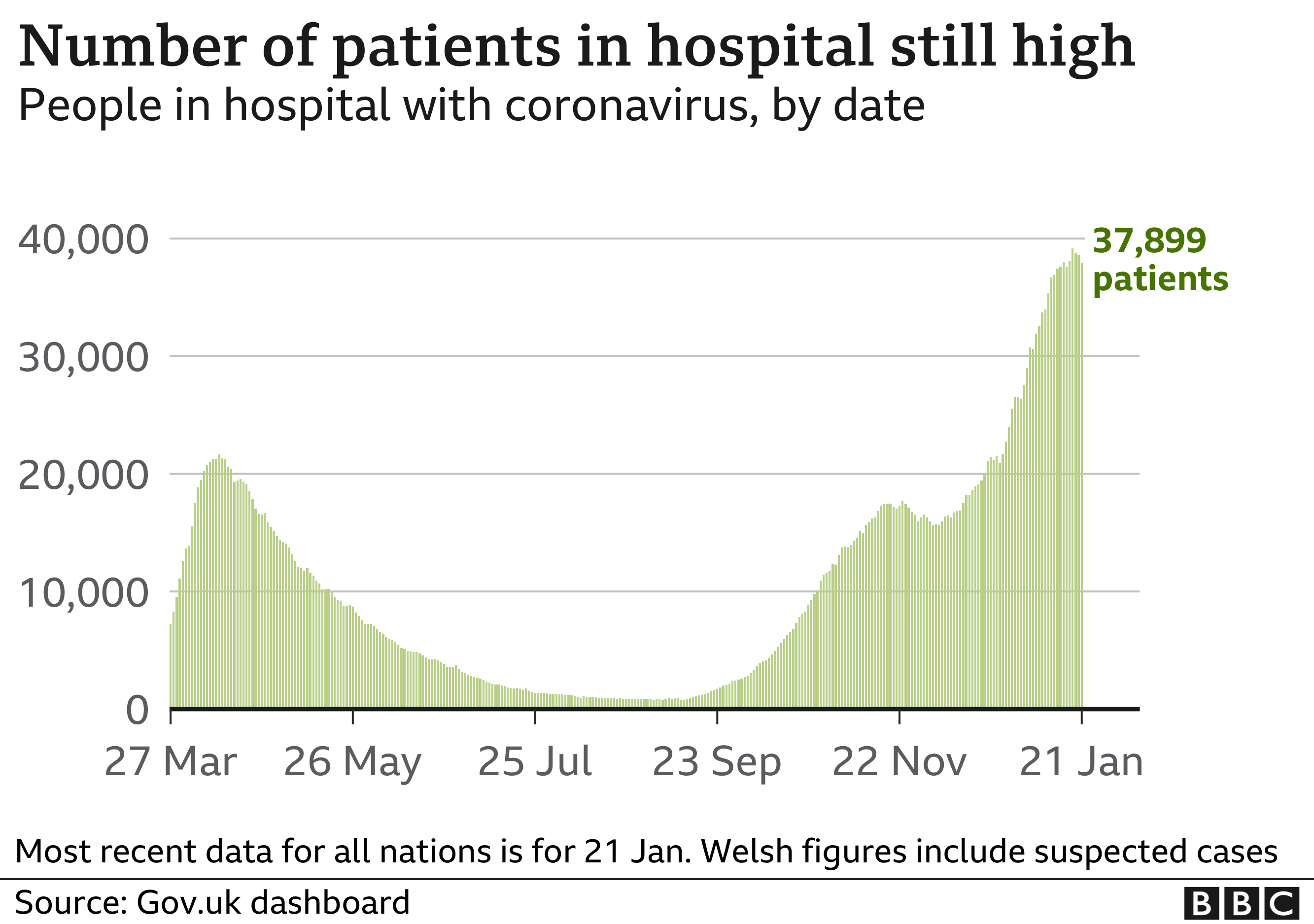It is "difficult to put a timeline" on when England's lockdown could be lifted, Matt Hancock has said.
The health secretary said there were "early signs" the measures were working but it was "not a moment to ease up".
He said there were 37,000 people in hospital with coronavirus in the UK and "more people on ventilators than at any time in this whole pandemic".
"The pressure on the NHS remains huge and we've got to get that case rate down," he said.
The number of coronavirus cases in the UK has been falling, but the number of people in hospital remains high, as does the UK's daily death numbers.
A further 592 people have died in the UK within 28 days of a positive Covid test and another 22,195 cases have been recorded, according to Monday's government figures.
The are 4,076 people in hospital on ventilators.
Under the national lockdown, people in England must stay at home and only go out for limited reasons.
This includes for food shopping, exercise, or work if they cannot do so from home. Similar measures are in place across much of Scotland, Wales and Northern Ireland.

At Monday's Downing Street press briefing, Mr Hancock said: "I understand the yearning people have to get out of this.
"The thing is that we have to look at the facts on the ground and we have to monitor those facts.
"And of course, everybody wants to have a timeline for that, but I think most people understand why it is difficult to put a timeline on it because it's a matter of monitoring the data."
He set out the factors the government would take into account when reaching decisions over lifting the restrictions, including: the death rate, the number of people in hospital, whether there were new coronavirus variants and the success of the vaccine rollout.
Almost four in five of the UK's over-80s have had the vaccine, Mr Hancock said, with nearly 6.6m people in total having had their first dose.


The falling numbers of infections being reported and the rising rate of vaccination are incredibly promising - even if the drop in infections reported on Monday may have been partly an artefact of fewer people coming forward for a test because of the snow.
But that does not offer any guarantees of a rapid lifting of lockdown.
What is concerning ministers are the high numbers in hospital.
The number of new admissions seems to have plateaued - but at a very high rate.
Close to 4,000 patients a day are being admitted to hospital.
To put that in context, that is four times the total number of all types of respiratory admissions the NHS would normally see in winter.
It means the numbers in hospital are at nearly twice the level they were at the peak in the spring during the first wave.
With better treatments available, patients are spending longer in hospital.
So come mid-February the pressures in hospital are likely to be very high, leaving ministers little wriggle-room to relax restrictions.
The big unknown, however, is what impact and how quickly vaccination will have an affect on admissions.
There is encouraging early news from Israel that hospitalisation really starts to drop three weeks after the first dose.
If that is repeated here, the picture could quickly change.
But until that happens the government - in the words of Health Secretary Matt Hancock - is urging the country to hold its nerve.

Speaking at the Downing Street press conference, Jenny Harries, deputy chief medical officer for England, warned: "We are not out of this by a very long way."
She said current coronavirus rates were still causing concern, patience was needed about the vaccination programme and the NHS still faced its usual winter pressures.
Susan Hopkins, from Public Health England, said the UK need to see the death rate "fall much lower" before any decision to ease measures.
She said teams were currently studying the impact on the UK's vaccine programme of the variant first identified in South Africa.
But she added the "consensus view" from four UK laboratories suggested that "the current vaccine works against the variant that was first discovered in the UK".

- LOOK-UP TOOL: How many cases in your area?
- SOCIAL DISTANCING: Can I give my friends a hug?
- JOBS: Can my boss force me to go to work?

In other developments:
- Prime Minister Boris Johnson has said the government will tell teachers and parents when schools in England can reopen "as soon as we can", but would not guarantee schools would reopen before April's Easter break.
- Scientists have said there is a chance a variant first detected in South Africa may impede the effectiveness of current vaccines
- Ministers will meet this week to consider imposing tougher restrictions on people arriving from abroad, including the possibility of quarantining travellers in hotels
- Meanwhile, Labour leader Sir Keir Starmer has announced he has to self isolate once again after being notified that he had come into contact with someone who has tested positive for coronavirus


https://news.google.com/__i/rss/rd/articles/CBMiJmh0dHBzOi8vd3d3LmJiYy5jby51ay9uZXdzL3VrLTU1ODA0Mjc20gEqaHR0cHM6Ly93d3cuYmJjLmNvLnVrL25ld3MvYW1wL3VrLTU1ODA0Mjc2?oc=5
2021-01-25 19:44:00Z
CBMiJmh0dHBzOi8vd3d3LmJiYy5jby51ay9uZXdzL3VrLTU1ODA0Mjc20gEqaHR0cHM6Ly93d3cuYmJjLmNvLnVrL25ld3MvYW1wL3VrLTU1ODA0Mjc2
Tidak ada komentar:
Posting Komentar